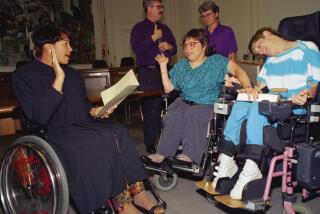‘Death Is Not a Disease’
- Share via
Thank you, Judith Paterson, for saying so well what so many of us believe. After having worked many hours in many different intensive care units where we ruthlessly flog these nearly dead bodies in an effort to squeeze out a few more days of “life,” I have come to suspect that after these poor people have lost the ability to talk, eat, control bowel and bladder functions, or think, the only cognitive function left to them is the ability to sense pain. And yet it continues to happen. Why?
One reason is that the politician is a very timid animal and easily intimidated by a small but very noisy group in our society who feel that life in any form at any cost is better than death. There is no leadership in taking the legal steps necessary to enable this punishment to stop.
A second reason is that hovering around these near-dead bodies is a swarm of lawyers, each hoping to take advantage of a grieving relative’s guilt and turn it into rage against medicine for not “doing everything possible.”
Our current approach to this problem is cruel and wildly expensive. We need to recognize that there are intelligent and decent people, in this country and in cultures other than our own, for whom death is preferable to humiliation.
MARK BROWN, M.D., J.D.
Malibu


